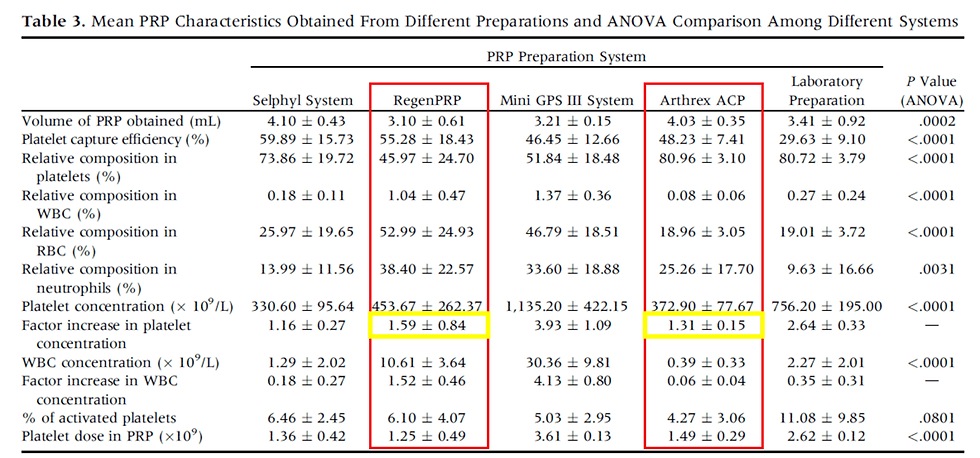Regenerative Research Roundup - July 2022
- MDBiologix
- Jul 4, 2022
- 4 min read

Welcome to the Regenerative Research Roundup, where we look through recently published research and bring you the best of the best in a quick-to-read digest.
This month we're exploring another under-dosed PRP study; adipose-based injections for Knee OA; effect of diet on platelet function; and quality-of-life improvements with PRP for hair restoration.
Let's explore!
The effectiveness of leucocyte-poor platelet-rich plasma injections on symptomatic early osteoarthritis of the knee: the PEAK randomized controlled trial
The Bone & Joint Journal // LOE: l
In the most recent edition of under-dosed PRP studies, we have a submission from the Bone & Joint journal that found no evidence that single or multiple PRP injections had any additional beneficial effect compared to saline injection.
The PEAK RCT study recruited 102 patients with early OA and allocated treatment as follows: One PRP injection followed by two placebo injections, or three PRP injections. Each injection was given one week apart.
While the study did not characterize their PRP output, the preparation system used was Arthrex's ACP which we know routinely concentrates a product to <2x baseline according to published literature. Armed with this knowledge, it's no surprise that the patients did not experience any benefit when receiving this plasma-based therapy, even over 3 injections.

Under-dosed PRP studies continue to create heterogeneity in the literature that can make it difficult to interpret outcomes. To better understand how to analyze PRP studies, read our article here: https://www.mdbiologix.com/post/how-to-evaluate-prp-research-the-good-the-bad-the-ugly
Short-term results of intra-articular injections of stromal vascular fraction for early knee osteoarthritis
Journal of Orthopaedic Surgery & Research // LOE: ll
The use of advanced biologics such as BMA and Lipoaspirate are becoming increasingly popular due to their elevated concentrations of mesenchymal stem cells, which may offer a stronger regenerative "punch" when compared with injections of PRP.
Authors of this study investigated the effect of intra-articular injections of stromal vascular fraction (SVF) in early knee osteoarthritis. The production of SVF typically includes a "enzymatic degradation" step following lipoaspirate. The metholodogy of this study does not indicate such a step following lipoaspirate filtration, therefore, it appears that this biologic would be more appropriately characterized as a purified fat graft like that produced by the Harvest AdiPrep system.

Nonetheless, 123 patients received 10-15ml of purified fat graft and were monitored for 6 months. There were statistically significant improvements in KOOS and VAS scores at all time points. Interestingly, there did not seem to be any notable difference between patients of more significant KL grades.
ACCESS HERE: https://doi.org/10.1186/s13018-022-03196-0
The Effect of Diet on Platelet Rich Plasma (PRP) Based Treatments
Journal of Arthritis // LOE: lll
This is a rather interesting article that explores a widely-discussed but under-researched area of biologics therapy. Namely, the impact of diet and nutrition on platelet function. This includes their intrinsic capacity to release multiple, platelet-derived growth factors at super-physiological concentrations promoting tissue repair.
Authors conducted a literature search and found significant diet-induced changes in platelet aggregation in 5 studies - identifying dark chocolate, energy drinks, dietary nitrate, aged garlic extract, and diets high in saturated fats or flavonoids as potential effectors. All compounds with the exception of energy drinks decreased platelet aggregation.
Other agents including ketorolac, propacetamol and magnesium were all reported to reduce platelet activation whilst cyclosporin A had the opposite effect. Limited evidence suggests a short-term increase in platelet aggregation and activation following moderate to high intensity exercise, with a subsequent reduction in the longer-term.
ACCESS HERE: https://www.iomcworld.org/open-access/the-effect-of-diet-on-platelet-rich-plasma-prp-based-treatments.pdf
Platelet-Rich Plasma for Treatment of Hair Loss Improves Patient-Reported Quality of Life
Plastic and Reconstructive Surgery // LOE: ll
Clinical evidence supporting the use of PRP in hair restoration continues to grow at a hard-to-ignore rate. However, much of this clinical evidence has focused (rightfully so) on the objective analysis of hair growth.
Authors of this study out of Cleveland Clinic, in Ohio, characterized the quality-of-life improvements seen in patients that underwent PRP treatment for hair restoration. Notably, many of the included patients had tried other interventions such as finasteride and minoxidil (i.e. Rogaine) previously.
Overall, ninety-two patients receiving PRP treatments were analyzed according to HAIRDEX, which is a disease-specific validated scale used to assess quality of life (QoL) for patients with androgenic alopecia (AGA) or alopecia areata (AA). According to this outcome score, emotional well-being, symptoms, functioning, stigmatization, and self-confidence significantly improved following treatment.
ACCESS HERE: https://doi.org/10.1097/01.GOX.0000842672.36013.11
If you have any questions or comments regarding the above research, or are wondering how you can apply it to your regenerative practice, please leave a comment below or shoot me an email at cdowns@mdbiologix.com
Cheers!
Connor
This blog post provides general information to help the reader better understand regenerative medicine, musculoskeletal health, and any related subjects. The views and opinions expressed in this post are those of the author and may not reflect the views and opinions of MDBiologix. All content provided in this blog, website, or any linked materials, including text, graphics, images, patient profiles, outcomes, and information, are not intended and should not be considered or used as a substitute for medical advice, diagnosis, or treatment. Please always consult with a professional and certified healthcare provider to discuss if any treatment is right for you.




Comments